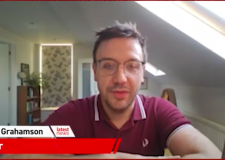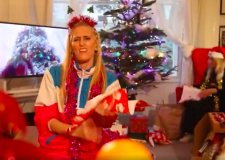Mark Brown
Deborah Espect speaks with London-based filmmaker Mark Brown.
Mark Brown is an award-winning writer and director based in London. His films have been selected in hundreds of festivals in the UK and worldwide and we recently featured two of them, the horror shorts Stained and Fiends with Benefits, in our Halloween festival on Latest TV.
• When did you realise you wanted to be a filmmaker?
I’ve always wanted to be one. My earliest memories are of films; the Wizard of Oz, Sinbad and the Eye of the Tiger, Jason and the Argonauts… I’ve always been obsessed by them and have never really tried to be anything else. I suppose it would have been when I was 14 or 15 when I decided that I wanted to make it my career. That’s when I started actively writing and planning.
• How did you go about realising your aspirations?
In all the wrong ways. I have no regrets as my choices to this point have left me with a beautiful family and a great set of friends. But I know I could have played the game a bit better. I went to Uni and did a pointless degree when I should have gone to film school or gone straight into the industry and learned my trade. Educationally-speaking, Uni was a waste of time for me. But I did do a filmmaking module where I learned editing (analogue so pretty pointless in today’s world) and I shot a film that was ridiculous but taught me that I could actually produce something if I made the effort. So when I left Uni, I started writing in earnest. I wrote a script that people seemed to like and then I did a slightly more focussed filmmaking course which again taught me nothing useful but did get me writing to a brief, and I made a slightly better film than my Uni one. It won this tiny award and so that was enough for me to up sticks and move to London. Once I was there, I kind of fell into theatre and became part of a theatre company. It’s here I really learned my trade. We produced close to 60 pieces of theatre over 3 years so through writing, producing, directing and giving feedback on other people’s scripts, I became a more capable writer. Then film came calling again and I started making short films with Phil Haine and my actor friends. Some were reasonably well produced and others were shot on a camcorder in an afternoon. Again, I learned a lot and made some good contacts and friends that helped push me on to writing feature films.
• How many films have you made so far?
I’ve recently directed my second feature film, Dead on the Vine. As a writer I’ve had four features produced and a load of shorts.
• How do you usually go about finding your cast and crew?
I usually find my cast from people that I’ve worked with or seen the work of, and so just give them a shout to see if they’re game for whatever it is I’m doing. I don’t like auditioning. It doesn’t give me a good idea of what that person would be like to work with. That’s as important to me as a person’s talents. If I’m going to be spending several weeks with a person, I want to come out the other side not wanting to kill them.
• What have been your biggest challenges when making your own films?
Raising money is always a challenge. The industry isn’t set up to help you that much. The gatekeepers want to find a reason not to give you aid and depending on current trends, those reasons are ever in flux so it’s a hard slog getting enough money to get stuff off the ground. There have been a lot of favours called in for both the films I’ve directed. That’s the positive side of the industry, in that those on the ground doing the work are usually incredibly generous and willing to help.
• You not only make your own films, but you also get commissions. How did this happen? Can you tell us about any of them?
I’ve been lucky enough to be able to work as a writer the past few years, but it’s not a stable industry, particularly recently with the pandemic, and the ever changing streaming landscape. But I get by. My first commission was in 2010 where I was brought on to adapt this supernatural thriller novel into a workable screenplay. The book was in diary form and didn’t work as a direct adaptation, so the hard work was figuring out a new structure for it that honoured the book whilst being a compelling film. It was a great experience despite the film not getting made in the end. It was my first Hollywood experience, having to deal with studio readers who are there seemingly to protect the big wigs from reading rubbish and to make sure the script is commercial enough. But I was working with some good producers who helped me as a novice navigate the rocky waters. I got the gig in a fairly roundabout way. I had written a short film that had gotten into a decent sized festival and the producer of that introduced me to another more experienced producer who was looking for a writer to work on a period boxing drama. Something in the short said to this chap that I was the man for the job. So we worked for over a year on that and we were pretty proud of the results. It was well received enough for the aforementioned Hollywood bods to take a punt on me as writer for the book adaptation. My other commissions have come about through recommendations from people I’ve worked with. Often the case has been, there is an imminent deadline and they need someone who can work at a high pace while maintaining a good standard and so the people that know me will throw my name in the hat and from there I usually have to give a little pitch on what I will do with the project, and they like it or they don’t.
• What are the challenges in writing a film for someone else?
I’ve had great and pretty bad experiences writing for other people. If I’m gettig paid to write someone else’s idea then I try my best to honour their intentions whilst bringing something interesting to the table. Sometimes I get it wrong and so we rework it or sometimes they don’t have a strong vision and so they use the process to figure out what they want. This is often no fun for me as a lack of direction on a project wastes everyone’s time. If I’m being employed to bring my unique sensibilities to a project then that is fun. I have worked with a producer on a couple of projects where he had his ideas for scripts but he let me loose to run with it. I need restraining sometimes, but I find that more productive than being prescribed to, which has happened a couple of times to poor effect. Communication is key in any collaboration and when that is poor then the project will be difficult and probably not very good. Everyone needs to be on the same page, but also open to the possibility that that page may need tearing out or scribbled on a lot.
• Out of all the films you’ve made, which is your favourite and why?
My new film Dead on the Vine is my favourite as the whole experience, aside from a protracted post-production, was fantastic. We shot it coming out of the first lockdown and it was set in a stunning vineyard in Sussex. So to come out of the darkness of our houses to the expansive beauty of the vineyard was just what we all needed. And to be doing something productive after the whole industry was forced to shut down was also quite the relief. I also got to work with a great cast and crew who taught me a huge amount, and my producer Laura worked miracles getting it all over the line under incredibly difficult circumstances. Also it is a film that would never have existed under any other circumstance so I feel very proud of it as an example of the fortitude of the arts.
• Do you feel that there has been a progression in your filmmaking style over the years?
Yes. I’ve only ever worked under huge constraints. Whether it’s a lack of time, a lack of quality equipment, people or money. So you learn to work with what you have and adjust accordingly. And through these, you learn what works and what doesn’t and so you take that onto the next film. When I shot Guardians, my first feature film, we designed it to take advantage of our location, a big old house full of oddities. We didn’t have any money or time so we tried to make the most of the eccentricities of the building and tried to be innovative with our shots, e.g. using mirrors to keep a shot going rather than reset for a different angle. Those kind of little choices helped establish a style of the film and it’s something I’ve maintained when I’m thinking about future projects. I do wonder what I’ll do if I ever get enough money to have a normal amount of time to do everything. Because sometimes the limitations work for you but other times it can work against you. There are a lot of shots on Dead on the Vine that we just didn’t have time for, so while we did an amazing job of getting it all in the can, and it looks good, I know there were a couple of ideas that I had to discard due no time, that I think could have positively added to the film. But this is the story on every film, I think.
• Is there anything in the earlier films that you’ve made, that you’d do differently now?
Guardians was a very naively made film, due to it being all of ours first feature. So knowing what I know now there is plenty I would do differently. But generally I’d just prepare more. If I’d had time, I’d have done camera tests with my DOP and actors to get a better sense of some of the sequences. I look back now and know some moments could have hit harder, had I thought about them a bit more. With Dead on the Vine, I’d have loved to have another week to work on the script. We didn’t have enough time between me finishing the script and the shoot to give it another pass, and so a few of the issues we discovered in the edit would have been worked out earlier.
• Let’s talk about your first feature, Guardians. Tell us about the process of getting this film off the ground
Page to set was pretty quick. I had the idea in October and we shot it in February. Then the edit took a while due to some outside circumstances beyond our control. So it was almost a year between finishing the shoot and our world premiere. Then it took 2 weeks to shoot. The first cut took about 3 weeks. The final cut as I said before took another 8 months as we had to shut down for 6 months. Then there was the sound and music which also took a while. When you have no money you are always working around other people’s schedules. I had some money set aside as seed money for a different film which never happened. It was a minuscule amount as it was only a small portion of a pot that was going to be made up of several other people. But I’d just shot my short film Corinthian in a day for about a grand and I thought if we used a cheaper camera and had less fighting I could get a feature in the can for about £5k. It ended up being £7k in the end. So the money was made up of my money and contributions from Fred Fournier (producer and editor) and Suz Smith (DOP). The main challenges we had was lack of time; and space. Despite the house being 5 storeys none of the rooms are particularly large. So getting a crew in along side the actors was a squeeze and so limited how we could shoot some of the sequences. We sent it to festival, and we had a pretty good run. We had our world premiere at an Alama Drafthouse Cinema in the US as part of the excellent Genreblast Film Festival. We also took home awards for Best Script, Ensemble and Supporting Actress for Victoria Johnston. We won 16 awards in total including Best Director at the Unrestricted View Film Festival, Best Script at Brenda Blethyn’s Ramsgate Film Festival, Best Comedy at the Join the Craic Film Festival and the Rome Independent Cinema Festival. We eventually got a sales agent (101 International) who took it to Cannes and the American Film Market where we sold it to Sky Store, Virgin Media, iTunes and Amazon. It is still available on Sky Store (UK only), iTunes and Amazon (UK, US and Canada).
• Who are your biggest influences?
Withnail and I was a big touchstone for Guardians. Also Henry Fool by Hal Hartley. But as for overall influences, it changes film to film. Dead on the Vine was inspired very much by the Coen brothers and some westerns.
• If there was one popular film that you could get paid to remake or reboot, which one would it be?
An American Werewolf in London. Not a remake. More an expansion. I have ideas. Also I don’t think there has ever been a truly great Hound of the Baskervilles. I’d love to have a crack at that.
• And finally, what advice would you give to aspiring filmmakers?
Find good people that get you. And then make lots of films with them. Use whatever you have a make as many things as you can. All the film schools and courses in the world can’t make up for actually just doing it.
You can find out more about Mark Brown through his website and Twitter handle.





















